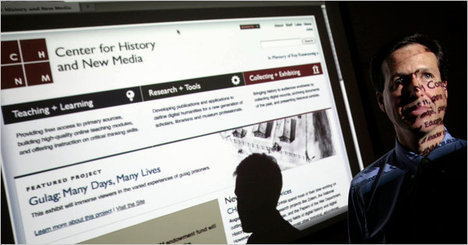 “Dan Cohen, director of the Center for History and New Media at George Mason University, is among the academics who advocate a more open, Web-based approach to reviewing scholarly works.” Source of caption and photo: online version of the NYT article quoted and cited below.
“Dan Cohen, director of the Center for History and New Media at George Mason University, is among the academics who advocate a more open, Web-based approach to reviewing scholarly works.” Source of caption and photo: online version of the NYT article quoted and cited below.
(p. A1) For professors, publishing in elite journals is an unavoidable part of university life. The grueling process of subjecting work to the up-or-down judgment of credentialed scholarly peers has been a cornerstone of academic culture since at least the mid-20th century.
. . .
“What we’re experiencing now is the most important transformation in our reading and writing tools since the invention of movable type,” said Katherine Rowe, a Renaissance specialist and media historian at Bryn Mawr College. “The way scholarly exchange is moving is radical, and we need to think about what it means for our fields.”
. . .
(p. A3) Today a small vanguard of digitally adept scholars is rethinking how knowledge is understood and judged by inviting online readers to comment on books in progress, compiling journals from blog posts and sometimes successfully petitioning their universities to grant promotions and tenure on the basis of non-peer-reviewed projects.
. . .
Each type of review has benefits and drawbacks.
The traditional method, in which independent experts evaluate a submission, often under a veil of anonymity, can take months, even years.
Clubby exclusiveness, sloppy editing and fraud have all marred peer review on occasion. Anonymity can help prevent personal bias, but it can also make reviewers less accountable; exclusiveness can help ensure quality control but can also narrow the range of feedback and participants. Open review more closely resembles Wikipedia behind the scenes, where anyone with an interest can post a comment. This open-door policy has made Wikipedia, on balance, a crucial reference resource.
Ms. Rowe said the goal is not necessarily to replace peer review but to use other, more open methods as well.
In some respects scientists and economists who have created online repositories for unpublished working papers, like repec.org, have more quickly adapted to digital life. Just this month, mathematicians used blogs and wikis to evaluate a supposed mathematical proof in the space of a week — the scholarly equivalent of warp speed.
For the full story, see:
PATRICIA COHEN. “Scholars Test Web Alternative to the Venerable Peer Review.” The New York Times (Tues., August 24, 2010): A1 & A3.
(Note: ellipses added.)
(Note: the online version of the review has the date August 23, 2010, and had the slightly shorter title “Scholars Test Web Alternative to Peer Review.”)

